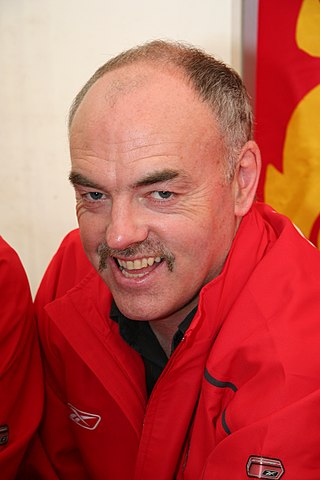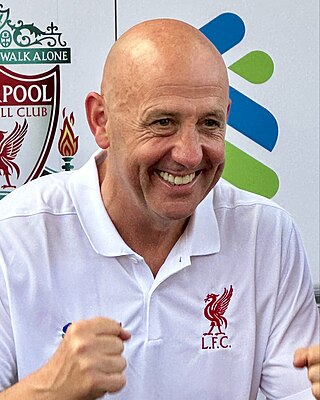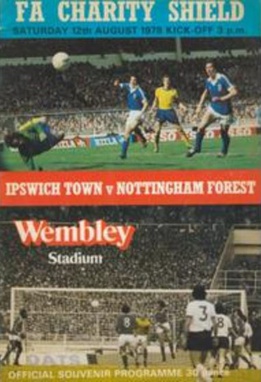
Peter Withe is an English former football manager and striker who played between 1971 and 1990. At Nottingham Forest he won the Anglo-Scottish Cup and Second Division promotion in 1976–77, First Division and the Football League Cup in 1977–78, and the 1978 FA Charity Shield. After a spell at Newcastle it was back to more success at Aston Villa with whom he won the First Division 1980–81, going on to score the only goal in the 1982 European Cup final and also win the 1982 European Super Cup. He played for England 11 times, scoring once, and was a squad member at the 1982 FIFA World Cup.
David Edward Johnson was an English professional footballer and manager who played as a forward and won major trophies for Liverpool in the 1970s and 1980s. He also played for Ipswich Town, Everton and other clubs, as well as the England national team.

John Wark is a Scottish former footballer who spent most of his playing time with Ipswich Town. He won a record four Player of the Year awards before becoming one of the four inaugural members of the club's Hall of Fame. Wark had long spells at the club, which bookended his career, and a third, brief interlude dividing his briefer periods at Liverpool and Middlesbrough. A versatile player, Wark played most of his professional games as a midfielder, although he sometimes played as a central defender and on occasion as a striker.

Gary McAllister MBE is a Scottish professional football coach and former player.
Michael Pejic is a former England international footballer who played in the English Football League for Stoke City, Everton and Aston Villa.

Michael Dennis Mills MBE is an English former footballer who played for Ipswich Town, Southampton and Stoke City. He managed Stoke City, Colchester United and Birmingham City. During his career he achieved Ipswich Town's record number of appearances and captained England at the 1982 World Cup.
Paul David Cooper is an English former professional footballer who played as a goalkeeper. He made more than 500 appearances in the Football League, most of them for Ipswich Town, where he won the 1978 FA Cup and the 1981 UEFA Cup and also gained a reputation for saving penalties. With 575 appearances for Ipswich, he is ranked fourth in the club's all-time appearances list.
Trevor John Whymark is a former England international footballer who played in the Football League in the 1970s and 1980s, notably with Ipswich Town. As of 2016, he is the team's sixth-highest goalscorer.
The 2000–01 season was the 121st season of competitive football in England.
1840s – 1850s – 1860s – 1870s – 1880s – 1890s – 1900s – 1910s – 1920s – 1930s – 1940s – 1950s – 1960s – 1970s – 1980s – 1990s – 2000s – 2010s – 2020s
The 1981–82 season was the 102nd season of competitive football in England. It was also the first season that the three-points-for-a-win system was introduced.
The 1980–81 season was the 101st season of competitive football in England.
The 1976–77 season was the 97th season of competitive football in England. This year The Football League revamped the tie-breaking criteria for teams level on points, replacing the traditional goal average tiebreaker with one based on goal difference to try to encourage more scoring. Coloured red and yellow cards were introduced for the first time in domestic English football.
The 1974–75 season was the 95th season of competitive football in England.
The 1980–81 season was Aston Villa's 81st in the Football League and their sixth consecutive season in the top division. They finished as league champions for the seventh time in their history, using just 14 players over the course of the campaign, of whom no fewer than seven were ever-present. Gary Shaw made 40 starts, Allan Evans 39 and Peter Withe, in his debut season, 36, with Gary Williams and Colin Gibson (19) contesting the remaining spot in the starting XI. David Geddis and Eamonn Deacy made eight and five starts respectively.
The 1981–82 season was the 83rd completed season of The Football League. This was the first league season with three points for win.
Robin David Turner is an English former professional footballer who played as a forward. An England youth international, he began his career at Ipswich Town. After being part of the FA Youth Cup winning squad of 1973, he made his first-team debut in October 1975. Despite failing to become a first-team regular, he remained at the club until 1985 when he signed for Swansea City. He scored twice on his home debut for his new club, equalling the number of league goals that he had scored in nine seasons at Ipswich, but left later in the year to return to East Anglia when he signed for Colchester United. At the end of the 1985–86 season he dropped into non-League football with Bury Town.

The 1978 FA Charity Shield was the 56th FA Charity Shield, an annual football match played between the winners of the previous season's Football League and FA Cup competitions. The match took place on 12 August 1978 at Wembley Stadium and was played between 1977–78 Football League champions Nottingham Forest and FA Cup winners Ipswich Town. Watched by a crowd of 68,000, the match ended in a 5–0 victory for Nottingham Forest.
During the 1980–81 English football season, Ipswich Town F.C. competed in the Football League First Division. In one of the most successful seasons in the club's history, they finished as runners-up in the league championship, were semi-finalists in the FA Cup and won the UEFA Cup. In all, Ipswich played a total of 66 competitive games during the season, winning 37, drawing 13 and losing 16.
The 1977–78 season was Arsenal Football Club's 52nd consecutive season in the Football League First Division. It was Terry Neill's second season as manager. Arsenal finished fifth in the league. In cup play, Arsenal reached the semi-finals in the League Cup, losing to the previous season's league and European champions Liverpool. Arsenal were also in the finals of the FA Cup, the first of three consecutive FA Cup finals that Arsenal would reach under Neill. They lost 1-0 to Ipswich.




